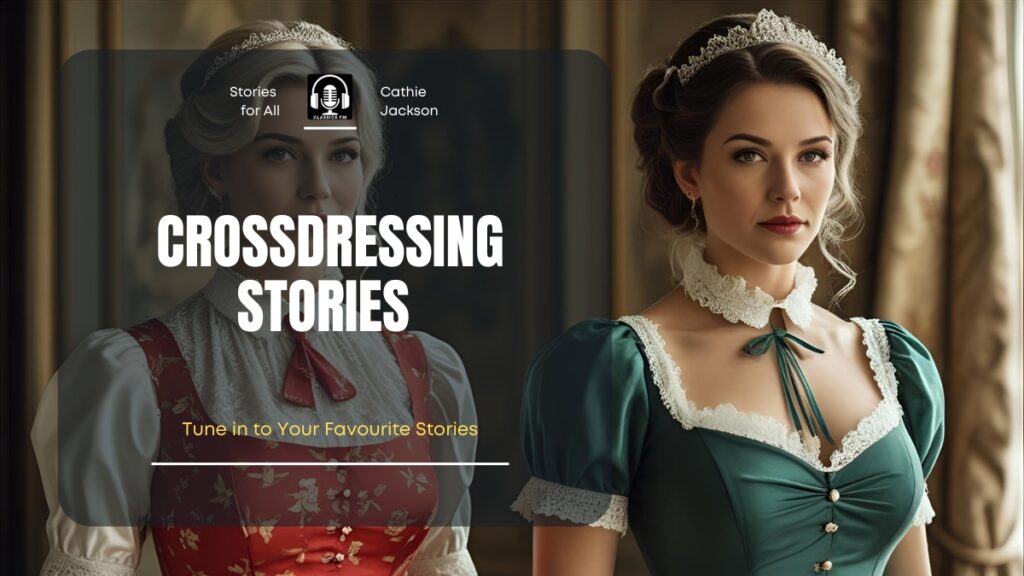Want Bible stories for kids that actually land? Not just words, but wonder, curiosity, and that little spark that makes them ask more questions.
Perfect. You are in the right place. This guide is written for real people, not search engines. It is warm, sometimes choppy on purpose, a little messy, and full of practical ways to tell, act out, and live the stories.
This is evergreen. The themes work across time. Courage, kindness, curiosity, and forgiveness are forever. Ready? Let us go.
Why Bible stories matter to kids?
Kids are wired for stories. Simple as that. A clear character. A big problem. A surprising twist. That is the formula. Bible stories bring vivid images into that formula.
Ark. Giant. Whale. A quiet stable. They stick in the imagination. But even better, they carry moral and emotional lessons that help children grow. Not preaching. Just seeds.
Stories teach language. Stories teach empathy. Stories teach how to sit with a hard idea and ask a question about it. That is why it matters more how you tell the story than which translation you quote.
Choose the right story for the right age
This is practical. Not everything works for every age.
Preschoolers
Keep it short. Use rhythm. Repetition is gold. Noah, Creation, The Lost Sheep, Daniel in the den with an edited, non-scary touch.
Early elementary
You can add a little tension. David and Goliath, Jonah with a whale-sized timeout, The Good Samaritan.
Older kids
Bring in nuance. Jonah’s feelings, David’s doubts, the reasons behind choices. Ask bigger questions. Why did people react that way? What would you have done?
If a story includes scary or heavy bits, soften the details. You do not have to erase reality. Emphasize feelings, outcomes, and hope instead of blood and gore. Kids will remember the emotion, not the anatomical detail.
Bible Stories for Kids
Step into a world of giants, miracles, and brave heroes! Bible stories for kids are full of adventure, life lessons, and fun surprises that inspire courage, kindness, and faith.
Elijah and the Whispering Wind
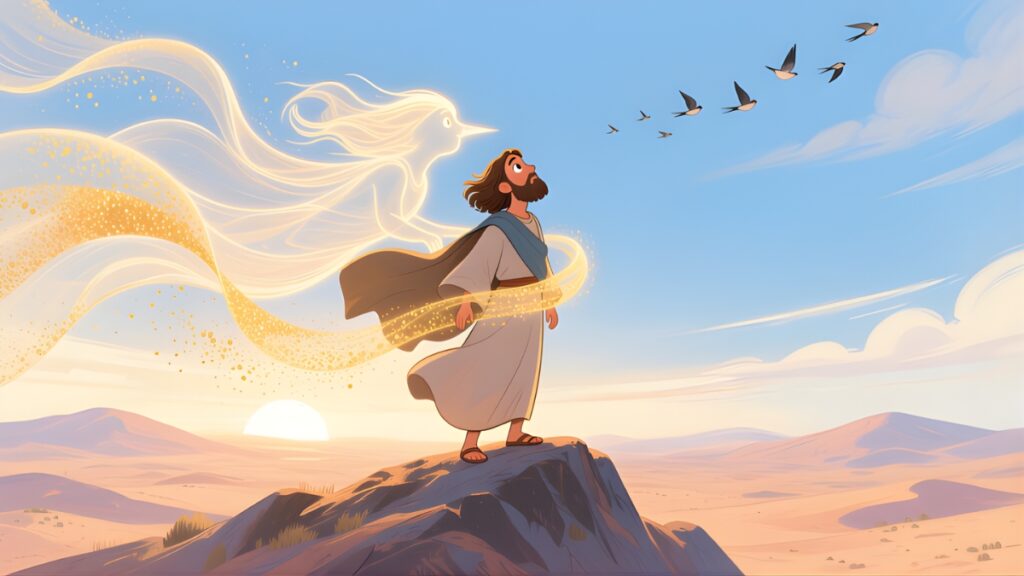
Elijah was tired.
Really tired.
He had been running for days, over mountains, through valleys, and his feet were sore. His heart felt heavier than a sack of rocks.
He finally stopped on the top of a mountain. The wind whipped at his cloak, bending trees and rustling the clouds. He hugged his knees.
“I can’t do this anymore,” he muttered.
Elijah had seen amazing things before. Fire falling from the sky, rain after years of drought—God had done big things through him.
But now, it all felt too much.
He had tried to help people believe, tried to guide them, and still… trouble followed him. People wanted to hurt him. He felt alone.
“God… are you there?” he whispered. “I don’t even know what to do next.”
The wind blew hard, rattling the rocks beneath him. He waited, expecting some huge, dramatic sign. Fire. Thunder. A booming voice. Something impossible to ignore.
But all he got was… wind.
Strong, wild wind. That’s it.
Elijah sighed. Maybe he had been wrong. Maybe God wasn’t here.
Then… the wind stopped.
Complete, perfect quiet.
Elijah blinked. Something was different. Something gentle brushed past his ear, soft and almost like a hug.
“Why are you here, Elijah?” the voice whispered.
Elijah jumped. “Who’s there?”
“It is Me,” said the soft voice. “I am here. I have always been here.”
Elijah’s heart thumped. He had expected fireworks. Thunder. Something big. Not a gentle whisper.
But the whisper was kind. Patient. Stronger than anything he’d felt before.
“Stop running,” the voice said. “You are not alone. You have done well. Keep trusting.”
Elijah’s eyes stung. Not from fear or sadness—relief.
The next morning, Elijah woke early.
He walked along the mountain, feeling the cold grass beneath his bare fingers. Birds chirped, rabbits hopped, and even a fox paused to watch him.
He realized life was still going on, quietly, all around him.
And he felt brave again.
He decided to help a village nearby.
He climbed down from the mountain and arrived at a town surrounded by wheat fields. The villagers looked worried. Crops were failing, and no one had seen rain for months.
“Hello,” Elijah said. “I can help.”
The villagers stared. “Who are you?” one asked. “You’re just one man.”
Elijah smiled faintly. “I trust God to guide me,” he said.
He showed them how to store water, care for animals, and plant seeds. Slowly, things started to improve.
Children followed him everywhere, asking questions, laughing when he scolded them for being too reckless. Adults listened quietly, trying to understand the lessons Elijah shared.
He taught them about faith and courage—not loud, flashy miracles, but quiet, steady trust in God.
One afternoon, a little boy ran up, panting.
“Elijah! Come quick! There’s a fire!”
A small fire had started in the wheat field. Smoke curled up, and villagers panicked.
Elijah didn’t hesitate. “Buckets! Everyone, buckets!” he shouted.
People worked together, passing water from hand to hand. Elijah remembered the whisper: courage isn’t always big. Sometimes it’s small acts, done carefully, with trust.
By sunset, the fire was out. The villagers cheered. Elijah smiled quietly.
As he traveled, Elijah helped more people: a sick farmer, a lonely widow, lost children in the forest. Each time, he felt the whisper guiding him.
God didn’t always need fire or storms. Sometimes God used patience, kindness, and quiet courage.
One night, Elijah camped under the stars.
He listened to the wind. It was soft, gentle, and the whisper came again.
“You are never alone, Elijah. You are doing well. Keep trusting.”
Elijah smiled. He understood now. Faith doesn’t have to be loud. Courage doesn’t have to be flashy.
Over the next months, Elijah grew wiser.
He learned to notice small miracles: a flower blooming after rain, a child learning to read, a simple smile bringing hope.
Even when he felt scared or tired, he remembered the whisper.
Faith could be quiet, but it could still be strong.
One morning, a woman carrying a basket of bread approached him.
“My crops are dying,” she said. “I don’t know what to do.”
Elijah knelt beside her. “You are not alone. God is with you. Let me help.”
Together, they planted seeds, watered soil, and cared for animals. By day’s end, the woman smiled.
“I see it now,” she said. “Even when we feel alone, help is near.”
Elijah realized the whisper had taught him the most important lesson:
Faith isn’t about fireworks.
Faith is about listening. About helping quietly. About trusting, even when no one sees.
Children began following Elijah, asking questions, wanting to hear stories.
He told them about the whisper in the wind. Some laughed. Some doubted. But they all learned something: miracles don’t have to be loud. They can be small, gentle, and quiet.
Years later, Elijah returned to the mountain where he first heard the whisper.
The wind blew hard, rattling the rocks. He closed his eyes.
And then it stopped.
Silence.
The gentle whisper came again.
“You have done well. Keep trusting.”
Elijah smiled.
Even when he grew old, Elijah walked through forests, mountains, and villages. He noticed flowers bloom, birds sing, and streams flow.
The whisper never left him.
He taught children to listen, trust, and help others.
Courage and faith were strongest when quiet, steady, and kind.
Elijah’s story reminds us that even when life is scary or lonely, God is with us.
Even when storms blow and the world seems chaotic, quiet courage can guide us.
Even small acts of kindness and patience can make a big difference.
And sometimes, the most powerful things are whispers, almost easy to miss—but strong enough to change everything.
The wind still blows today.
It whispers to anyone willing to listen.
And just like Elijah, we can hear it, trust it, and follow it—through the mountains, the valleys, and every storm.
Courage, faith, and love aren’t always loud.
Sometimes, they are whispers in the wind.
Shadrach, Meshach, and Abednego in the Fiery Furnace
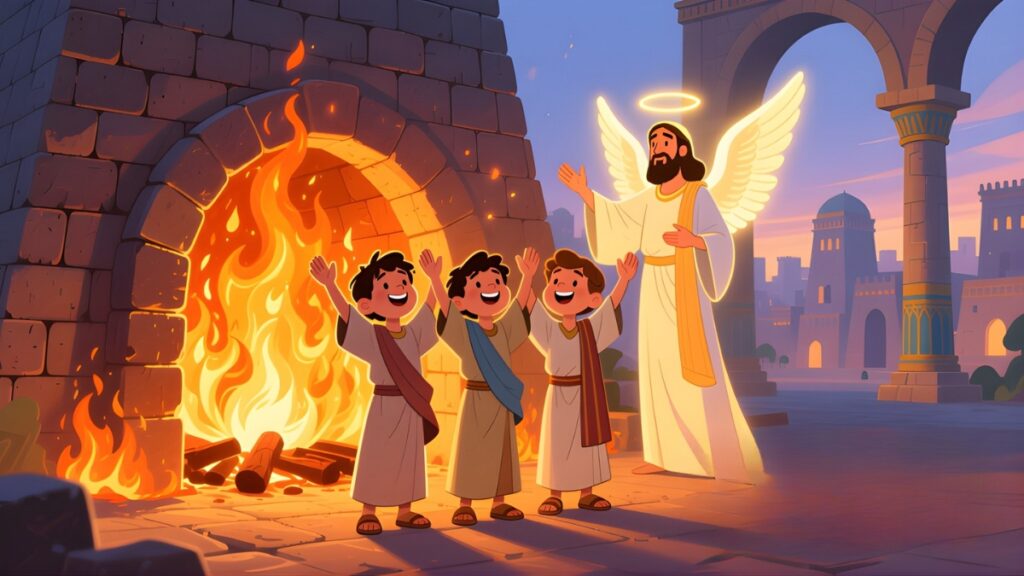
Shadrach, Meshach, and Abednego were best friends.
They laughed together, shared meals, and helped each other with chores.
But their friendship wasn’t the only thing that made them special.
They also loved God.
Not in a quiet, “I’ll pray later” kind of way, but with their whole hearts. Every day, they tried to do what was right, even when it was hard.
One day, a king named Nebuchadnezzar came to power.
He was strong, proud, and a little… bossy.
He had a golden statue made, so tall it almost touched the clouds. Everyone in the kingdom had to bow to it.
Everyone except Shadrach, Meshach, and Abednego.
“No way,” Shadrach whispered to his friends. “We can’t bow. That’s not right.”
Meshach nodded. “I agree. We follow God, not statues.”
Abednego crossed his arms. “Let’s stick together. Whatever happens, we stick together.”
Word got to King Nebuchadnezzar that three young men refused to bow.
He was furious.
“Bring them to me!” he roared. “If they don’t bow, they go into the fiery furnace!”
The guards dragged Shadrach, Meshach, and Abednego to the huge furnace. Flames danced like wild snakes, and the heat made the air shimmer.
The king sneered. “Bow now, or burn!”
Shadrach, chest out, didn’t flinch.
“King,” he said calmly, “we don’t need to bow. Our God can save us. But even if He doesn’t, we still will not bow.”
Nebuchadnezzar’s jaw dropped. Nobody had ever spoken to him like that.
“Really?” he shouted. “You would rather burn than obey me?”
“Yes,” they said together.
The king’s anger roared like the furnace itself.
“Heat it seven times hotter!” he yelled.
The soldiers stoked the fire, throwing in wood and oil. Smoke curled into the sky, black and thick.
Shadrach, Meshach, and Abednego were ready.
Inside the furnace, the flames hissed.
Heat licked their clothes.
Smoke stung their eyes.
But… something amazing happened.
They didn’t feel the flames.
They could see another figure walking with them in the fire.
It wasn’t the king.
It wasn’t a guard.
It was… God Himself.
A glowing, comforting presence, like sunlight and warmth all at once.
“You are not alone,” the voice said, soft but powerful.
The three friends smiled at each other.
Even the furnace couldn’t touch them.
Outside, King Nebuchadnezzar watched in disbelief.
“Wait a minute,” he muttered. “I see four people in there. Not three. And the fourth… He looks like a god!”
He rubbed his eyes. The flames roared, yet the three boys were unharmed. Their hair wasn’t singed, their clothes weren’t burned.
The king was stunned.
Shadrach, Meshach, and Abednego stepped out.
The air smelled like wood smoke, but they were completely fine.
The king’s jaw dropped.
“You are free,” he said. “Praise your God, who saved you from the fire. There is no other god who can do this!”
The three friends bowed politely but kept their heads high.
God had saved them.
The people of the kingdom whispered.
Some were amazed. Some were jealous.
But the story spread quickly: the God of Shadrach, Meshach, and Abednego is powerful and kind.
Even fire could not stop Him.
The friends went back to their home, laughing.
“Did you feel the heat?” Shadrach asked.
Meshach grinned. “Barely. I felt something stronger with us than the flames.”
Abednego nodded. “That’s God. He walked with us.”
And they never forgot that day.
Later, in quiet moments, they thought about the lessons they learned:
- Standing up for what is right is worth it, even when it’s scary.
- Faith can protect you in ways you don’t understand.
- True friends support each other when things get tough.
They shared the story with children, teaching them to trust God.
“Sometimes,” Shadrach would say, “things will seem impossible. But you are never alone.”
Meshach added, “Even if the world says you’re small, your faith is bigger than fire.”
Abednego finished, “Stick together, help each other, and never bow to what’s wrong.”
Over time, their story inspired many.
Young people found courage. Villagers prayed. People who had doubted learned to believe.
The story of the furnace became a story of hope.
One day, a young boy asked Shadrach, “Didn’t you feel scared?”
Shadrach smiled. “Yes. Of course. But fear is just part of the journey. Courage is acting even when you’re scared.”
Meshach said, “And God is with you. That’s what makes you brave.”
Abednego added, “Friends help too. Don’t forget that.”
The fiery furnace didn’t just test their faith.
It showed the power of standing strong, even against kings and fire.
It showed the importance of trusting God and each other.
And it proved that miracles aren’t just stories—they can happen in real life.
Even years later, people in the kingdom would tell the tale:
“There were three boys,” they’d say, “and a fire that couldn’t burn them. And a God who walks with those who are faithful.”
Children listened wide-eyed. Adults shook their heads in awe.
And the lesson stayed alive for generations: Faith is stronger than fear.
Shadrach, Meshach, and Abednego never stopped helping people.
They taught children to care for each other, to obey God, and to face challenges with courage.
They laughed together, prayed together, and remembered the furnace not as a scary day, but as a moment of God’s protection.
Even when storms came, even when life seemed unfair, the memory of the furnace reminded them of something bigger:
Courage, faith, and friendship can survive anything.
The story spread far and wide.
Children in faraway villages repeated it to their friends.
Parents told it at bedtime. Teachers used it as an example.
And every time someone faced a challenge, they remembered the three friends and the God who walked with them in the fire.
The moral was clear, simple, and powerful:
- Stand for what’s right, even when it’s scary.
- Trust God, no matter how impossible things seem.
- Lean on your friends, and support them in hard times.
Even now, if you feel scared or small, remember Shadrach, Meshach, and Abednego.
Imagine walking into a fire and feeling a gentle presence beside you.
That’s courage. That’s faith. That’s God.
And that’s a story worth remembering forever.
The Tiny Seed That Became a Tree
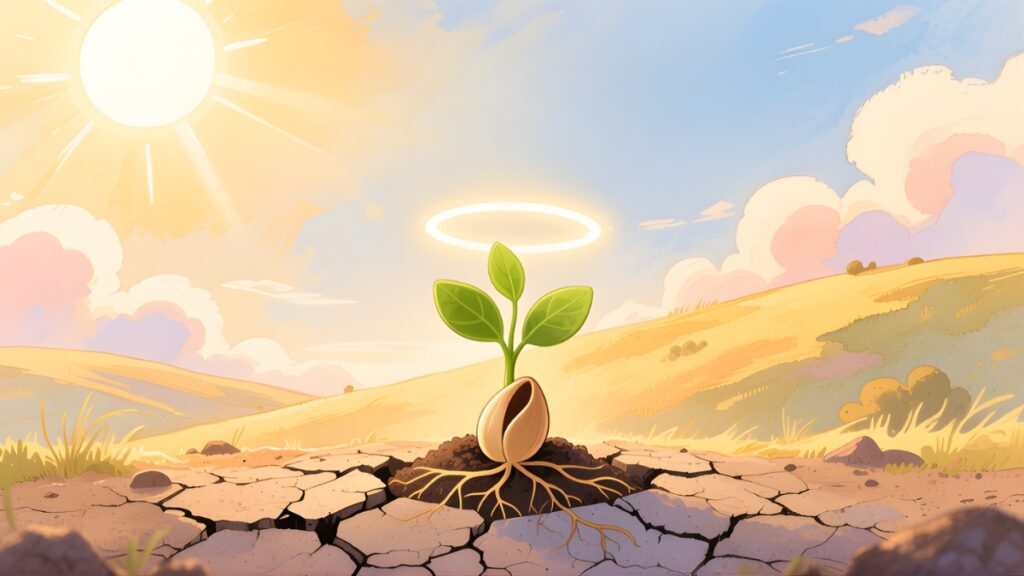
Once upon a time, there was a tiny seed.
So tiny, you could barely see it with your thumb.
It was brown and smooth and didn’t look like much at all.
But inside that little seed was something incredible: life.
The seed lay on the ground under a big, old tree.
It had fallen from the branches above, rolling softly into the soil.
Around it, birds chirped, ants marched, and worms wiggled through the dirt.
The seed watched the world and felt… small.
“I’m too tiny,” it whispered to itself. “I could never be a big tree like the others.”
One morning, the sun peeked through the clouds.
Its golden rays warmed the soil. The seed felt a tickle inside.
“Maybe… maybe I can grow,” it thought.
But it was scared. “What if I fail? What if I never become anything?”
A tiny voice inside it whispered back: “You can. Just start.”
So the seed began to grow.
First, a tiny sprout pushed through the soil.
It was wobbly and soft, but it reached for the sun anyway.
Raindrops fell on it, making it shiver and giggle.
“Hello, little sprout,” said a passing worm. “You look nervous.”
“I am,” said the sprout. “I don’t know if I can become a tree.”
“Patience,” said the worm. “Everything takes time. Just keep growing.”
Days turned into weeks.
The sprout grew taller. Tiny leaves unfurled, reaching toward the sky.
A little bird perched on one of its new branches.
“Hey there, sprout,” said the bird. “You’ll be a tree one day, I promise.”
“I hope so,” said the sprout. “But I’m still so small.”
“Small doesn’t mean nothing,” chirped the bird. “Even the tiniest seed can become something big.”
As the seasons changed, the sprout faced challenges.
Strong winds whipped through the valley, bending it nearly to the ground.
Rainstorms poured down, shaking its tiny roots.
One night, a fox trampled over the soil, nearly crushing it.
The sprout trembled. “I’m not sure I can do this,” it whispered.
But then it felt the warmth of the sun again.
And the gentle push of the rain soaking the soil.
And the encouragement from the creatures around it.
“I can try,” said the sprout. “I will keep growing.”
Years passed.
The little sprout became a sapling. Its trunk thickened, its branches stretched higher.
Birds built nests in it. Squirrels ran along its limbs. Children rested in its shade.
Every day, the tree remembered the tiny seed it had been.
“I was so small,” it thought. “And now… look at me.”
One summer day, a boy named Eli wandered into the grove.
He was sad because his kite had broken, and he had nowhere to fly it.
He sat beneath the growing tree. Its branches shaded him from the hot sun.
He looked up and whispered, “I wish I could fly like my kite did.”
A gentle breeze rustled the leaves.
The tree seemed to lean slightly toward him.
“Everything grows in its own time,” the breeze seemed to say.
Eli smiled. Somehow, he felt better.
He rested there for hours, thinking about the tiny seed that became this big, strong tree.
“Even the smallest things can become amazing,” he said aloud.
And the tree’s leaves shimmered in agreement.
The seasons passed again.
The tree grew taller, stronger, and wider. Its roots dug deep into the soil, holding it steady through storms and droughts.
Birds nested in it, foxes slept under it, and children played around it.
Even the ants remembered the little seed that had started it all.
One autumn, the wind blew fiercely, shaking the branches.
Leaves fluttered like golden confetti.
Eli came back, older now, carrying a tiny sapling in his hands.
“I want to plant it,” he said. “I want it to grow strong like this tree.”
The tree’s leaves swayed gently, almost like it was nodding in approval.
“You were once small too,” the tree seemed to say. “And look how far you’ve come.”
The tiny sapling was planted next to the tree.
Eli watered it. He whispered stories of courage, patience, and faith to it.
The big tree’s branches stretched protectively over the little one.
“Grow, little seed,” it seemed to say. “You can become amazing too.
Over the years, the big tree became a symbol in the village.
People came to rest in its shade.
Children learned lessons under its branches.
It reminded everyone: small beginnings can lead to great things.
Even the tiniest seed can grow into something strong and beautiful.
The tree also learned about patience.
It couldn’t grow overnight. It couldn’t skip the storms or the cold.
It had to wait for sunlight, rain, and the passing seasons.
And through it all, it kept growing.
One day, a group of children sat under the tree.
They asked questions:
“How did you grow so big?”
The tree whispered in the rustling of its leaves:
“I was small once. I faced storms. I kept trying. I trusted the sun, the rain, and the soil. And I never gave up.”
The children listened, eyes wide.
One said, “So even if we’re small, we can do big things too?”
The tree’s leaves shivered in the wind.
“Yes,” the wind seemed to answer. “Even the tiniest seed can become a mighty tree.”
Years passed, and the tree’s story spread.
People in the village told children about the tiny seed.
They told travelers and friends.
And everyone remembered: courage, patience, and faith can make something small grow into something amazing.
The tree grew older. Its branches stretched high, its roots dug deep.
Birds nested in its arms, children played under its shade, and even the animals that once wiggled near the little seed came back to see it.
It had become more than a tree.
It had become a reminder.
A reminder that life begins small, but with patience, care, and faith, it can grow into something extraordinary.
One spring morning, Eli returned, much older now.
He placed a bench beneath the tree and smiled.
“I grew up with you,” he said. “You taught me that even the tiniest things can make a difference.”
The tree swayed, leaves brushing the ground, as if nodding.
“Yes,” it seemed to say. “You remember the seed. Never forget the journey.”
The tiny seed that once trembled in the soil had become a mighty tree.
Its roots held fast through storms. Its branches reached for the sky.
Its leaves whispered lessons of hope, courage, and patience.
And every time a seed falls into the earth, it dreams of growing into a tree just like it.
Even now, if you plant a seed and water it, it can grow.
It will face storms. It will feel small.
But if it keeps reaching for the sun, listening to the rain, and trusting the soil, one day it can become amazing.
Just like the tiny seed that became a tree.
And that tree?
It will always be there to remind us that small beginnings can grow into big, beautiful things.
All it takes is a little patience, a lot of care, and a little faith.
Elisha and the Floating Axe Head
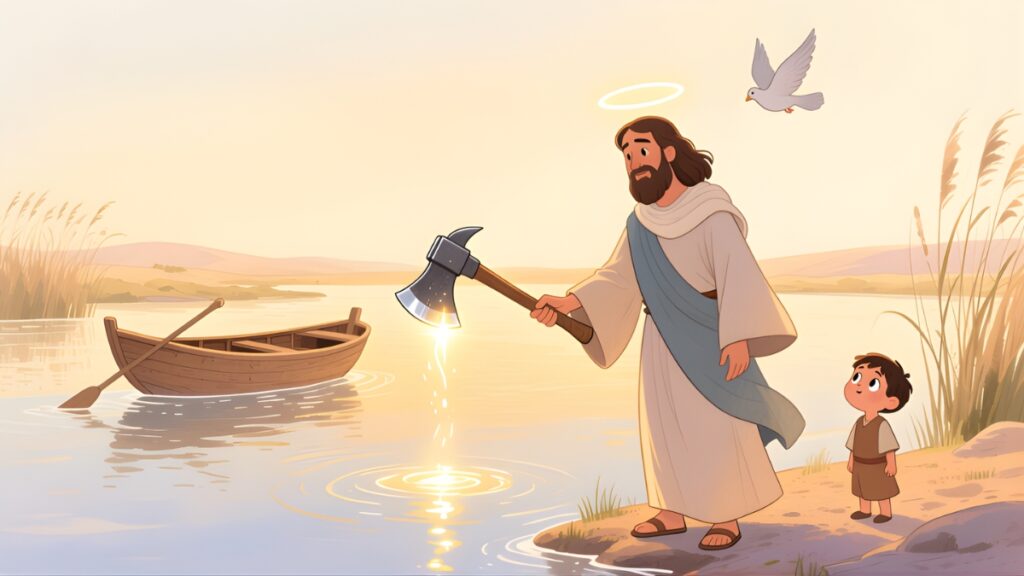
Once upon a time, there was a man named Elisha.
He wasn’t a king or a warrior, but he had something even more special: he trusted God completely.
Elisha helped people, shared wisdom, and performed miracles—not for fame, but to help others.
One sunny morning, Elisha was walking along a quiet river.
The birds chirped. Fish jumped out of the water. Leaves floated lazily downstream.
It was peaceful, the kind of day that made you feel everything in the world would be okay.
Elisha smiled, enjoying the calm.
Meanwhile, a young man named Gehazi was nearby, chopping wood with an axe.
He was learning from Elisha and wanted to impress him.
“Look at me!” he shouted. “I’m strong and fast!”
He swung the axe, and the blade flew off the handle.
It bounced, hit a rock, and… splaaash!
The axe head sank straight to the bottom of the river.
Gehazi’s eyes went wide.
“Oh no! Master! The axe is gone! It sank!”
He stared at the dark water, panic rising in his chest.
“That was an expensive tool,” he muttered. “How can we replace it?”
Elisha came over, calm as ever.
“Where did it fall?” he asked.
Gehazi pointed to the spot in the river.
Elisha smiled softly. “Don’t worry. Pick up a stick,” he said.
Gehazi frowned. “A stick? But… the axe is metal! It’s heavy! How can a stick help?”
Elisha’s eyes twinkled. “Trust me. God can do amazing things, even in small ways.”
Gehazi hesitated, but he trusted Elisha.
He found a stick lying on the riverbank.
Elisha walked with him to the spot where the axe had sunk.
He gently touched the water with the stick.
And… something incredible happened.
The axe head floated to the surface!
Gehazi gasped. “It’s… it’s floating! How?!”
Elisha chuckled. “God helps us, even with small problems. Sometimes we just need a little faith.”
Gehazi scooped up the axe and held it tight.
“I thought… I thought it was lost forever,” he said, smiling.
Elisha nodded. “When we trust God, even things that seem impossible can happen. Don’t worry about how. Just believe.”
Gehazi’s heart felt lighter. He realized it wasn’t just about the axe.
It was about trust, hope, and helping each other.
Over the next few days, Gehazi told the story to everyone in the village.
“Did you hear? Elisha made an axe float!”
The villagers laughed and shook their heads.
“Maybe it’s magic,” one said.
Elisha smiled. “It’s not magic,” he explained. “It’s God. He helps those who trust Him, in big ways and small.”
Gehazi learned another lesson too: helpfulness matters.
If he hadn’t been honest and told Elisha about the lost axe, he might have tried to fix it himself and only made things worse.
Being truthful and asking for help is important, even for small problems.
One morning, the river was calm again, and the sun sparkled on the water.
Elisha and Gehazi sat on the riverbank, talking.
“Master,” Gehazi asked, “why did God care about an axe head? It’s just a tool.”
Elisha smiled. “Sometimes, it’s not about the axe. It’s about the people. God cares about us. Even small worries matter to Him.”
Gehazi nodded slowly.
“I get it now,” he said. “Even little things can be important if they help someone.”
A few weeks later, another villager lost something in the river—a small basket of grain.
They ran to Elisha, worried it was gone forever.
Elisha went with them, just as before.
He touched the water with a stick, and the basket floated to the surface.
The villagers gasped.
Elisha smiled and whispered, “God helps, even with small things. Don’t forget to trust Him.”
The story of the floating axe head spread across the land.
Children told it to their friends. Adults repeated it to their families.
Everyone learned the same lesson:
- Don’t panic over small problems.
- Trust God, even when things seem impossible.
- Ask for help when you need it.
Gehazi never forgot that day.
Whenever he faced challenges, he remembered the river, the stick, and the floating axe.
It reminded him that God’s help is always near, whether the problem is huge or tiny.
One rainy afternoon, Gehazi was walking along the same river.
A little boy dropped his toy boat into the water.
It floated away quickly, and the boy started to cry.
Gehazi smiled, kneeling by the river.
“Don’t worry,” he said. “We’ll get it back.”
He found a stick and reached into the water carefully.
The boat bobbed to the surface.
The boy’s eyes lit up.
“Thank you!” he shouted.
Gehazi handed it back. “It’s nothing,” he said. “Just trust, a little patience, and God’s help.”
Years passed, and Gehazi became known for helping others.
Whenever someone lost something or faced a small problem, he remembered the floating axe head.
He never bragged about it. He just quietly helped, knowing God could do amazing things through simple acts of kindness.
One summer, a young girl approached the river, looking sad.
“My cat fell in!” she cried.
Gehazi hurried to her side.
He picked up a stick, touched the water, and carefully guided the little cat back to shore.
The girl hugged her cat tightly. “Thank you! You saved her!”
Gehazi smiled and whispered to himself, “Just a stick… and a little faith.”
Elisha, watching from a distance, smiled too.
He knew that miracles weren’t always big.
Sometimes, they were small, quiet, and gentle.
Sometimes, they were floating an axe or saving a child’s toy.
But every miracle reminded people of hope, trust, and God’s care.
The floating axe head taught Gehazi and the villagers three important lessons:
- Trust God – Even if the problem seems impossible, God can help.
- Help others – Small acts of kindness matter.
- Don’t give up – Even little problems can be solved with patience and faith.
Even now, if you walk by a river, imagine a tiny axe head lying in the water.
God can help it float, just as He can help you with small worries, big worries, or anything in between.
And if you’re ever unsure, remember Elisha’s words:
“Trust, patience, and kindness can make even the smallest thing extraordinary.”
The river still flows.
The axe head may be long gone.
But the story of faith, helpfulness, and hope floats on forever.
And anyone who listens carefully can hear the whisper of God in even the tiniest miracles.
Peter Walks on Water
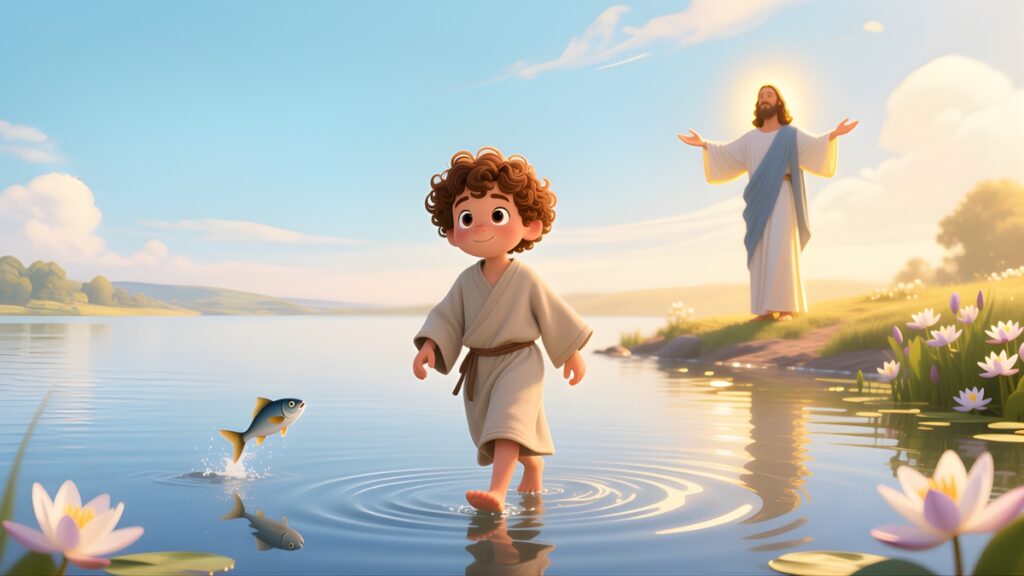
It was night, and the lake was rough.
Waves slapped against the boat. Wind howled like a pack of wolves.
Peter and the disciples were rowing with all their might.
Their muscles ached. Their eyes were tired. And their hearts… their hearts were nervous.
The storm had come suddenly.
One moment, the water was calm, reflecting the stars like glass.
The next, the sky was gray, clouds twisting like angry giants.
Rain splashed down, and lightning lit up the horizon.
The disciples gripped the oars tightly, trying not to panic.
Then Peter saw Him.
Jesus.
He was walking on the water.
Not in a boat. Not swimming. Walking. On the water.
Peter blinked. “Is… is that really Him?” he whispered.
The disciples gasped. Some fell to their knees. Others clutched each other.
But Peter, ever impulsive, felt something stir in his heart.
“That’s Jesus! He can do anything! Maybe… maybe I can too!”
He pointed. “Lord! If it’s really You, tell me to come to You on the water!”
Jesus’ eyes were calm, warm, and full of love.
“Come,” He said simply.
Peter’s heart pounded. His friends shouted, “Are you crazy? Don’t do it!”
But Peter didn’t listen. He climbed over the side of the boat, hands trembling, legs shaking.
“Here goes nothing,” he muttered.
And then… his feet touched the water.
He didn’t sink.
He really didn’t!
Peter looked down. His sandals floated. The water rippled beneath him, but his feet stayed dry.
He laughed. “I’m… walking! I’m really walking on water!”
Jesus smiled at him, calm and steady. “Keep going, Peter.”
For a moment, Peter felt like the bravest man in the world.
The wind whipped around him, but he didn’t care. He was walking toward Jesus, step by step.
He could almost touch Him. Almost.
Then… doubt crept in.
“What if I fall? What if I sink? What if the water swallows me?”
Peter looked down at the churning waves. They seemed taller, angrier.
His heart raced. Fear prickled his skin.
Suddenly, his feet slipped.
“Help me, Lord!” Peter shouted.
The waves surged, water splashing his legs. For the first time, he felt the weight of the storm.
But then… strong hands grabbed him.
“Peter! Why did you doubt?” Jesus said, lifting him out of the water.
Peter gasped for air. “I… I was scared,” he admitted, shaking.
Jesus smiled. “Even the bravest hearts can be afraid. That’s okay. Courage doesn’t mean never feeling fear. It means trusting Me anyway.”
Together, they stepped back into the boat.
The wind calmed a little, the waves softened, and the storm seemed less frightening.
The disciples stared, mouths open.
Peter, still dripping, grinned sheepishly. “I walked on water… sort of,” he said.
Jesus laughed, a sound like sunshine breaking through clouds.
“Faith can take you further than you imagine,” He said. “Even when fear tries to pull you under.”
Peter nodded. He realized the lesson wasn’t about walking on water.
It was about trust.
Faith. Courage. Believing even when things seem impossible.
Over the next few days, Peter kept thinking about the storm.
The waves. The fear. The thrill of stepping out of the boat.
He remembered Jesus’ hand lifting him up.
He told the other disciples, “I was terrified, but I learned something important. Fear can shake even the strongest hearts, but trust can carry us through.”
The disciples practiced what they learned every day.
Sometimes it was small—helping a neighbor, feeding a hungry child, speaking up when someone was treated unfairly.
Other times, it was big—facing challenges, storms, and even danger.
But Peter always remembered: fear is normal. Courage comes from trust.
One evening, Peter and a few children were at the lake, skipping stones.
One stone skipped farther than the others and almost hit a duck.
“Oops!” Peter laughed. “Even little storms can surprise you. But look—nothing terrible happened.”
The children giggled, and Peter said, “It’s just like the waves on the big lake. Fear can make it seem worse than it is. Trust makes it manageable.”
The story of Peter walking on water spread quickly.
People told it in villages, schools, and homes.
Children would act it out, pretending to walk on the water, holding their arms out for balance.
Parents smiled, repeating the lessons:
- Courage doesn’t mean you aren’t scared.
- Faith helps you keep moving, even when things look impossible.
- Trust can carry you through storms.
Peter thought about the storm often.
He remembered the thrill, the panic, the laughter, and the hand of Jesus pulling him up.
And he learned to recognize fear—not as a weakness, but as a signal.
A reminder to reach out, to trust, and to keep moving forward.
Years later, Peter would face bigger storms.
Storms that weren’t water, but challenges of life.
Storms of responsibility, mistakes, doubts, and hard decisions.
But he never forgot that night on the lake.
Even when fear shook his heart, he remembered Jesus’ words:
“Courage doesn’t mean never feeling fear. It means trusting Me anyway.”
Peter became known not just for walking on water, but for the courage he carried in his heart.
He helped friends, guided children, and shared stories of faith and trust.
Every story he told had one lesson: trust can make the impossible possible.
One day, Peter took a young boy to the lake.
The boy hesitated at the water’s edge, afraid to step in.
“Don’t worry,” Peter said. “Even if the waves seem scary, you can trust. Step carefully, and I’ll be with you.”
The boy took a step. And another.
Soon, he was laughing, walking in the shallows.
Peter smiled. “See? Courage is just trust in action.”
Even now, if you imagine a stormy lake, with waves crashing and winds howling, remember Peter.
Remember how fear came.
Remember how courage meant reaching out, stepping forward, and trusting.
Even when your heart is shaking, even when things seem impossible.
Peter’s story teaches children—and adults—something simple but powerful:
- Fear is normal.
- Courage is acting even when afraid.
- Trust in God helps you face storms, big or small.
The wind still blows on lakes today.
The waves still crash.
And every time someone steps forward with trust, they are walking in Peter’s footsteps.
Faith can make you brave.
Faith can make the impossible possible.
And faith can carry you, even when the storm is roaring.
The lake glimmers in the sunlight.
Peter’s footsteps may have faded, but the lesson remains.
Courage isn’t the absence of fear.
Courage is trust, step by step, even when the water shakes beneath your feet.
And every child, and every adult, can learn to step out of the boat—because trust is stronger than fear.
Tabitha the Kindhearted
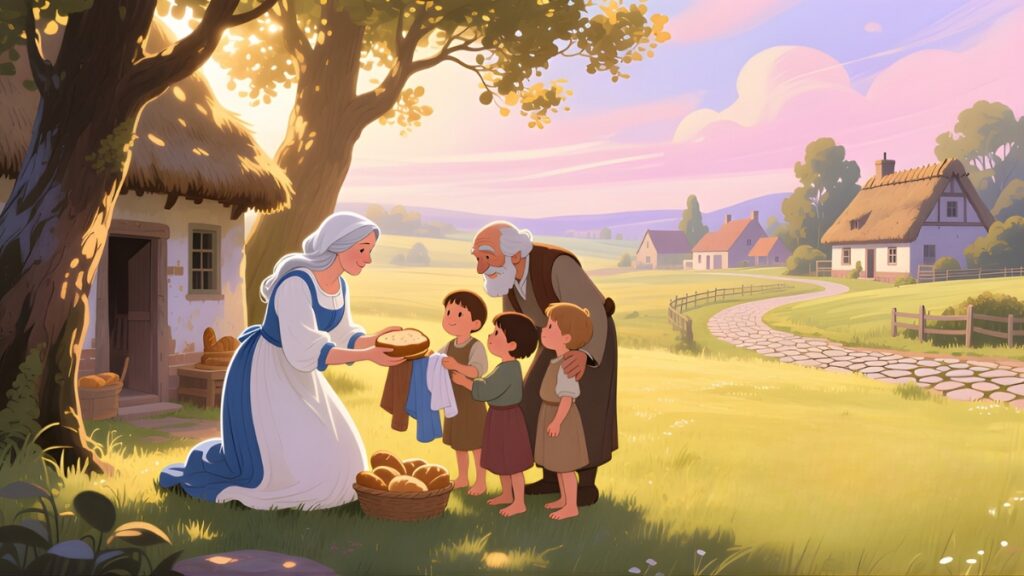
In a small town by the sea, there lived a woman named Tabitha.
She wasn’t famous or rich. She didn’t have a big house or sparkling jewelry.
But what she had was even better: a heart full of kindness.
Every morning, Tabitha woke before sunrise.
She would sweep her small home, light a fire in the hearth, and begin sewing clothes.
Not for herself, mind you.
She sewed for widows, children, and anyone who needed warmth.
Her fingers moved quickly, but carefully, stitching love into every seam.
The neighbors loved her.
“Tabitha,” they said, “you make the best clothes in town!”
She smiled softly. “It’s not about me,” she said. “It’s about helping others.”
Her little home became a place of joy. People would drop by for advice, a warm smile, or just a listening ear.
One morning, a young widow knocked on her door.
“Tabitha,” she said softly, “my children have no shoes. The winter is coming, and we cannot afford them.”
Tabitha put down her needle. “Don’t worry,” she said. “We’ll fix that today.”
She measured the children’s feet, picked bright fabric, and soon had small shoes ready.
The widow’s eyes filled with tears. “I don’t know how to thank you,” she whispered.
“No thanks needed,” Tabitha said. “Just help someone else when you can.”
Tabitha didn’t stop there.
She made blankets, fed the hungry, and mended torn clothes.
Every day she looked for someone who needed her help.
Even the smallest act—a loaf of bread, a patched coat—made a big difference.
One afternoon, a little girl ran into town crying.
“My kitten is missing!” she wailed.
Tabitha knelt down. “Don’t worry. Let’s look together.”
They searched the streets, calling the kitten’s name.
Finally, behind a market stall, they found it.
The girl hugged her kitten tightly. “Thank you, Tabitha! You helped me!”
Tabitha smiled. “Sometimes helping is as simple as listening and looking carefully.”
People began to notice.
Neighbors talked about Tabitha’s kindness.
Children wanted to be like her.
Even the town leaders were impressed.
But Tabitha never sought attention. She just did what was right.
One day, a big storm came.
Rain poured down, roofs leaked, and the streets flooded.
Many families were trapped, their homes soaked and belongings ruined.
Tabitha didn’t hesitate. She ran through the storm, bringing blankets, dry clothes, and food.
Neighbors shouted, “Are you crazy, Tabitha?”
She laughed, drenched but happy. “Kindness doesn’t wait for sunshine!”
By the next morning, the storm had passed.
Families were safe, fed, and comforted.
Tabitha’s small acts of courage and compassion had saved many hearts from despair.
Children hugged her, adults thanked her, and even strangers came to help her help others.
One afternoon, Peter, one of the town’s elders, visited her.
“Tabitha,” he said, “God has noticed your deeds. You have been generous to many, and now your kindness inspires everyone.”
Tabitha blushed. “I just do what I can,” she said softly. “Even small acts can make a difference.”
Peter smiled. “Small acts can become miracles. You show that love is stronger than any hardship.”
Tabitha taught an important lesson: generosity isn’t about wealth.
It’s about caring.
It’s about noticing the person next to you, and doing what you can to help.
Even a warm coat, a loaf of bread, or a smile can change someone’s day.
One morning, a group of children asked her, “Tabitha, why do you help everyone?”
She paused, thinking.
“Because kindness grows,” she said. “When you help one person, they may help another. And soon, the whole town becomes a better place.”
The children nodded, inspired.
They decided to help too—feeding stray animals, carrying groceries, and helping neighbors with chores.
Tabitha noticed, smiling.
“See?” she said. “Kindness spreads like sunlight. A small ray can brighten a dark room.”
And she was right.
Months passed, and the town grew closer.
Neighbors helped each other. Children learned compassion. Strangers were welcomed.
All because Tabitha showed them what it means to care.
Even when she was tired, she never stopped.
Sometimes, she worked late into the night, stitching and sewing, humming softly.
Her hands were tired, but her heart was full.
She reminded everyone that even small deeds, done with love, can create big changes.
One evening, as the sun set, she looked out over the town.
She saw children playing, neighbors smiling, and families enjoying warm meals.
She realized something amazing: one person’s kindness can ripple out, touching everyone around them.
And it all started with her willingness to help, day by day.
The story of Tabitha spread to other towns.
People shared it around fires, at markets, and in schools.
“Who is this woman?” they asked.
“Tabitha,” someone replied. “She shows that even the smallest acts of kindness can make the world brighter.”
Tabitha never sought fame. She never wanted glory.
She wanted to care. To feed. To comfort. To teach.
And her life became a lesson for everyone:
- Generosity isn’t about wealth.
- Compassion matters more than power.
- Even small acts can make a huge difference.
Years later, a young girl named Miriam followed in Tabitha’s footsteps.
She helped widows, children, and the poor.
She remembered the stories of Tabitha’s warmth, courage, and patience.
And every time she helped someone, she remembered: a little love can ripple far.
Tabitha’s legacy lived on.
Every blanket sewn, every loaf of bread shared, every smile given, carried her heart forward.
The town became a community of helpers. People looked out for one another.
All because one kindhearted woman decided to care.
Even today, if you visit the town, you can hear stories of Tabitha.
Children learn about her generosity in school. Adults remember her courage.
And anyone who acts with kindness is carrying her legacy forward.
Her story teaches children—and adults—something simple but powerful:
- Small acts of kindness matter.
- Helping others creates a ripple of goodness.
- Generosity and compassion are gifts anyone can share.
Tabitha showed that one person’s heart can change a whole town.
A kind word, a helping hand, a warm meal—each can grow into something wonderful.
And when we follow her example, the world becomes brighter, happier, and more loving.
Her hands may have rested eventually.
Her needle may have been put away.
But the lives she touched, the hearts she warmed, and the example she set—those never faded.
So, when you see someone in need, remember Tabitha.
Smile. Offer help. Share what you can.
Even a little bit of kindness can make the biggest difference.
And that is the story of Tabitha the Kindhearted—a woman whose gentle deeds and caring heart turned small acts into big miracles.
David and Goliath
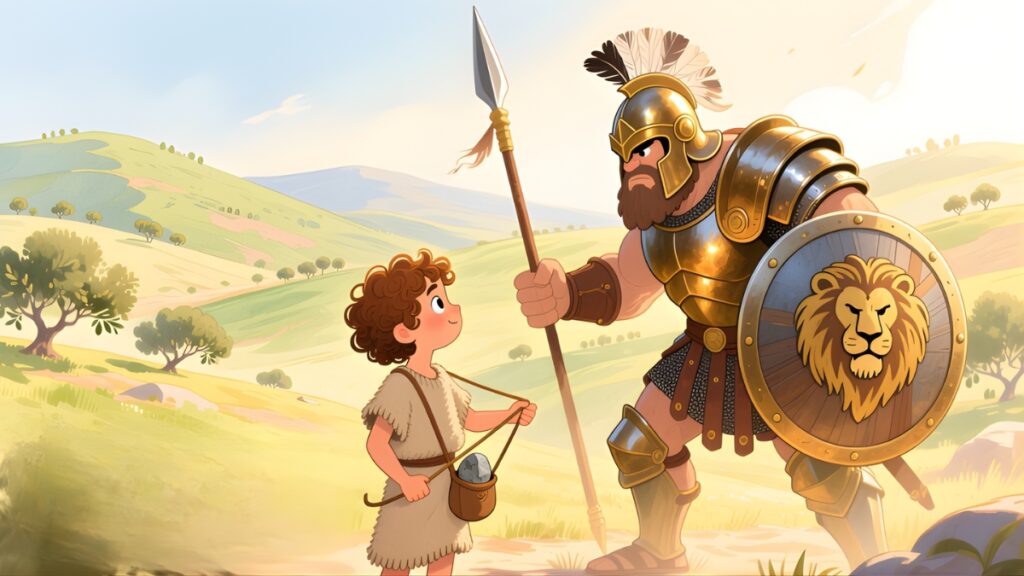
A long time ago, in the land of Israel, there was a young boy named David.
David was small, younger than his brothers, and not a soldier.
He spent his days tending sheep, playing his harp, and singing songs to God.
But even though he was small, his heart was brave.
David’s father sent him to the battlefield one day, carrying food for his brothers.
When he arrived, he saw something terrifying.
A giant stood on the other side, towering over the soldiers.
His name was Goliath.
Goliath was massive.
He wore heavy armor, held a huge spear, and laughed at the Israelites.
“Who will fight me?” he bellowed. His voice echoed across the valley.
The soldiers of Israel trembled.
Day after day, Goliath challenged them. Day after day, no one stepped forward.
David watched from the sidelines, his heart pounding.
He saw the fear in the soldiers’ eyes. He saw the sadness on his brothers’ faces.
“How can we let this giant scare us?” David asked himself.
He clenched his fists. “I may be small, but God is big. And with God, I can do anything.”
David approached King Saul.
“Let me fight him!” he said.
The king laughed. “You? You’re just a boy! That giant has killed men before you were born!”
But David explained, “I have defended my sheep from lions and bears. God helped me then, and He will help me now. This isn’t just about me—it’s about God’s honor.”
Saul hesitated but eventually agreed.
He offered David his armor.
David tried it on. The helmet was too heavy. The armor weighed him down.
“I can’t move in this,” David said, shaking his head. “I’ll trust God, not armor.”
David picked up five smooth stones from the riverbed.
He put them in his pouch.
He grabbed his sling.
And he walked toward the giant, fearless.
Goliath laughed when he saw David.
“You come to fight me with sticks and stones?” he roared.
David answered, “You come with sword and spear, but I come in the name of the Lord. Today, God will give you into my hands.”
The soldiers held their breath.
The giant’s eyes widened in disbelief.
David ran toward Goliath.
He swung his sling and let one of the stones fly.
It spun through the air and… struck Goliath right in the forehead!
The giant staggered, then fell to the ground with a thunderous crash.
Silence fell across the valley.
David ran to the giant and, with Goliath’s own sword, made sure the battle was over.
The Philistines fled. The Israelites cheered.
David had defeated the impossible—because he trusted God.
The people celebrated David’s bravery.
But David knew the victory wasn’t just about his courage.
It was about faith. It was about trusting that God could do the impossible.
And it was about remembering that even the smallest person can make a big difference when God is on their side.
David’s brothers were amazed.
“David, how could you do it?” they asked.
David smiled. “I didn’t do it alone. God helped me. And He can help anyone who trusts Him.”
The soldiers nodded, remembering how fear had held them back before.
The story of David and Goliath spread across the land.
Children acted it out, pretending to be brave with stones in their hands.
Adults retold it to inspire courage in others.
Everyone remembered: size and strength aren’t everything. Faith and courage matter more.
David continued to grow in wisdom and strength.
He faced challenges again and again, but he never forgot that day in the valley.
He remembered that even a young boy could face a giant when he trusted God.
One day, David visited a village and saw children playing with sticks.
He smiled. “Those are good stones, but remember—faith is stronger than any weapon. Courage comes from trusting God.”
The children nodded, eyes wide.
“Yes,” he said. “Even small people can do mighty things with God’s help.”
David’s story teaches children—and adults—several important lessons:
- Courage isn’t about size.
- Trusting God gives strength.
- Even the smallest actions can have the biggest impact.
- Fear can be overcome with faith.
Years later, David became a king.
He ruled with wisdom and kindness, remembering the lesson of the stone and the giant.
Even when challenges came, he trusted God and remembered that faith, not fear, was the true power.
Children in Israel continued to hear the story.
They imagined the giant, the stones, and the boy who trusted God more than anything else.
They learned to face their fears, to trust in God, and to believe that they could make a difference—no matter their size.
The valley where David faced Goliath became a place of inspiration.
People came to remember that courage comes from faith, not physical strength.
That even a young boy can change the world when he believes in God.
Even now, if you ever feel small or scared, remember David.
Remember the courage it took to face a giant.
Remember the faith that made the impossible possible.
And remember: God can help you face any challenge, no matter how big or scary it seems.
The story of David and Goliath is not just about a boy and a giant.
It’s about believing in something greater than yourself.
It’s about knowing that even if you’re small, you can do mighty things.
And it’s about remembering that courage comes from faith, not from swords or armor.
So when you face your own giants—whether it’s a scary test, a tough decision, or a big fear—remember David.
Pick up your “stones” of faith.
Step forward with courage.
And trust that God is with you, every step of the way.
Faith, courage, and trust—they are the real weapons that help us face giants.
And the smallest person with the biggest faith can do the greatest things.
That’s the story of David and Goliath.
Voice and style that works
The secret is simple. Be human. Not robotic. Not too polished. Mix short sentences with long ones. Use fragments. Add a small aside. Make them part of the story by asking direct questions. Use colloquial words where they feel natural. A tiny bit of slang or a local phrase can make the story cozy. Keep it universal enough so children from different backgrounds still feel welcome.
Example of voice choices:
- Short: “He was small. He was brave. He stepped forward.”
- Long: “He had been a shepherd for many quiet days, watching sheep and thinking up songs, and when the giant stepped forward the whole valley seemed to hold its breath.”
- Fragment: “A sling. A stone. A heartbeat.”
- Question: “What would you do if someone told you to stand up to a giant?”
That kind of variety keeps attention. It breaks the pattern that a machine would love. Good.
Tiny storyteller etiquette
A few quick rules that actually help:
- Start with a hook. A question, a sound, or a prop.
- Use images and sounds. A bowl of water becomes the ocean. Tap the table for thunder.
- Pause. Let a question hang. Let kids answer.
- Keep it short for younger listeners. Stretch only when they beg for more.
- Use props. A toy sheep, a stuffed animal ark, a paper crown. Props turn imagination into action.
- Repeat a phrase kids love. They will join in. That makes the story theirs.
Retellings with talking points and activities
Below are short retellings and ways to extend them into play, reflection, or craft. Use them directly or change details to fit your voice and your children.
Creation: The Big Everything Story
Once there was no light. Then light arrived. Sky, land, plants, animals, and finally people. Each day something new woke up. It sounds simple because it is simple. The world became a place full of things to touch, taste, and wonder about. And it was good.
Talking points
What is the most amazing thing you see every day? Why?
Activity
Make a seven-panel flipbook or simple drawings for day one through day seven. Quick scribbles are perfect.
Handling tough or scary parts
Some biblical moments include violence or loss. With kids, do not dwell on graphic detail. Speak to the emotion behind the event. Use language that centers love, memory, and meaning.
If a child asks a blunt question about death or suffering, answer honestly but simply. You can say, “That was sad. People felt very sad. They remember the person and talk about the good things that person did.” Offer comfort. Offer a moment of silence. Offer a small ritual like lighting a candle or making a memory card.
Games and crafts that make stories stick
Children learn by doing. After a story, try one of these:
- 60 second drawing: fast pictures of the main scene.
- Role-play: give kids short roles and props and let them act it out.
- Moral jar: write short acts like share, forgive, help and draw one each week.
- Snack parable: use cookie halves to practice fairness and sharing. Be mindful of allergies.
- Journal prompt: older kids write how they might act as David or Jonah. Honest, not perfect.
These help memory and empathy. They make the story live in small actions.
Questions to spark deeper thinking
For older listeners you can ask:
- Why do you think this character chose that?
- What would you have done?
- Who do you see in your life that acts like the Good Samaritan?
- If you were telling this story, what detail would you add?
- Do you think the lesson changes with time and place?
These are not tests. They are open doors to thinking and conversation.
Cultural sensitivity and versions
Bible stories exist in many translations and retellings across cultures. That is rich. When telling in a mixed group be mindful. Some families lean more toward one tradition. Keep it inclusive. Invite kids to share how their family tells the same story.
Avoid framing other cultures or groups as wrong. Focus on the universal human reactions and emotions.
Making storytelling a habit
Want a practical routine that lasts? Try this:
- Pick a regular time: bedtime, after dinner, or rainy afternoons.
- Keep a small story bag: one toy sheep, a small boat, a paper crown.
- Record short versions on your phone, if you are comfortable doing so, so kids can hear a familiar voice later.
- Let kids retell. Their versions will be messy and beautiful.
- Keep a rotating list: one short story, one medium, one reflective.
Tradition grows from repetition. It does not have to be perfect.
What to avoid
- Avoid turning the story into a lecture.
- Avoid too many facts in a single telling. Keep the heart clear.
- Avoid scaring children with too much detail.
- Avoid assuming every listener knows the cultural background. Briefly set the scene.
Small storyteller’s toolkit
A quick checklist to keep on your phone:
- Hook. Get attention in 10 seconds.
- One strong image. Make them see it.
- One simple moral. Not more than two.
- One question. Ask and listen.
- One activity. Make it stick.
- End on hope. Always.
Practical, quick, usable. That is the point.
A Gentle Pep Talk
You do not need to be perfect. You do not need to know every verse by heart. You need curiosity, a sense of wonder, and the courage to be a little imperfect. Be willing to mess up a line and laugh.
Be willing to stop when a child looks bored and come back later. That honesty builds trust more than flawless recitation ever could.
Final Notes on Evergreen Teaching
In the end, evergreen teaching isn’t about perfection or complexity—it’s about connection. When we keep things simple and human, stories stop being just lessons and start becoming reflections of who we are.
They remind us to listen, to care, and to keep learning with open hearts. Over time, the best stories don’t just teach; they nurture kindness, curiosity, and quiet courage. And that is their true, lasting power.


